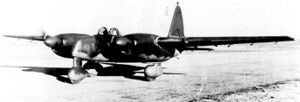Engineering:Fleetwings BQ-1
| XBQ-1 | |
|---|---|

| |
| Role | Flying bomb |
| National origin | United States |
| Manufacturer | Fleetwings |
| First flight | May 1944 |
| Primary user | United States Army Air Forces |
| Number built | 1 |
| Variants | Fleetwings BQ-2 |
The Fleetwings BQ-1 was an early expendable unmanned aerial vehicle — referred to at the time as an "assault drone" — developed by Fleetwings during the Second World War for use by the United States Army Air Forces . Only a single example of the type was built, the program being cancelled following the crash of the prototype on its first flight.
Development
Development of the BQ-1 began on July 10, 1942, under a program for the development of "aerial torpedoes" – unmanned aircraft carrying internal bombs – that had been instigated in March of that year. Fleetwings was contracted to build a single XBQ-1 assault drone,[1] powered by two Franklin O-405-7 opposed piston engines, and fitted with a fixed landing gear in tricycle configuration. The aircraft was optionally piloted; a single-seat cockpit was installed for ferry and training flights; a fairing would replace the cockpit canopy on operational missions.[2] The BQ-1 was intended to carry a 2,000 pounds (910 kg) warhead over a range of 1,717 miles (2,763 km) at 225 miles per hour (362 km/h); the aircraft would be destroyed in the act of striking the target.[1] A single BQ-2 was to be constructed as well under the same contract.[1]
Flight testing
Following trials of the television-based command guidance system using a PQ-12 target drone, and earlier trials of the XBQ-2A, the XBQ-1 flew in May 1944; however, the aircraft crashed on 17 July 1944 due to engine failure just after take-off from Wright Field. Following the loss of the lone prototype BQ-1, the project was cancelled.[1]
Specifications (XBQ-1)
Data from [2]
General characteristics
- Crew: 1 (optional)
- Wingspan: 48 ft 7 in (14.81 m)
- Gross weight: 7,700 lb (3,493 kg)
- Powerplant: 2 × Franklin O-405-7 opposed piston engines, 225 hp (168 kW) each
Performance
- Cruise speed: 225 mph (362 km/h, 196 kn)
- Range: 1,717 mi (2,763 km, 1,492 nmi)
Armament
- 2,000 pounds (910 kg) warhead
See also
Related development
Aircraft of comparable role, configuration and era
References
- Notes
- Bibliography
- Parsch, Andreas (2005). "Fleetwings BQ-1/2". Directory of U.S. Military Rockets and Missiles, Appendix 1: Early Missiles and Drones. designation-systems.net. http://www.designation-systems.net/dusrm/app1/bq-1.html.
- Werrell, Kenneth P. (1985). The Evolution of the Cruise Missile. Maxwell AFB, Alabama: Air University Press. ISBN 978-1478363057.
 |

